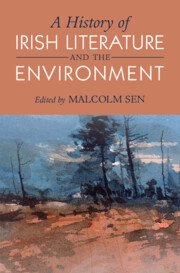Book contents
- A History of Irish Literature and the Environment
- A History of Irish Literature and the Environment
- Copyright page
- Contents
- Figures
- Tables
- Contributors
- Introduction Culture, Climate, Capital, and Contagion
- Chapter 1 Landscape and Literature in Medieval Ireland
- Chapter 2 The Irish Annals and Climate, Fifth–Seventeenth Centuries CE
- Chapter 3 The Environmental Vocabulary of Irish Folklore
- Chapter 4 Narratives of Arboreal Landscapes
- Chapter 5 Famine and Ecology, 1750–1900
- Chapter 6 Political Ecology in Nationalist Literature, 1880–1922
- Chapter 7 Solastalgic Modernism and the West in Irish Literature, 1900–1950
- Chapter 8 The Ecology of the Irish Big House, 1900–1950
- Chapter 9 Refuge and Domestic Space in Northern Irish Poetry, ca. 1940–Present
- Chapter 10 Irish Travellers, the Environment, and Literature
- Chapter 11 The Oceanic Imaginaries of Modern Irish Writing
- Chapter 12 Landscape in Irish-Language Literature: Poetry and Prose, 1900–2000
- Chapter 13 Poetry and Place
- Chapter 14 Animals and Climate Crisis in Irish Poetry
- Chapter 15 Animals and Animality in Irish Fiction
- Chapter 16 The Political Ecology of Food and Hunger, 1950–Present
- Chapter 17 Built Environments and Lived Ecologies in Contemporary Irish Poetry, 1998–Present
- Chapter 18 Transnationalism and Environment in Contemporary Irish Literature
- Chapter 19 Energy Futures in Contemporary Irish Fiction
- Bibliography
- Index
Chapter 17 - Built Environments and Lived Ecologies in Contemporary Irish Poetry, 1998–Present
Published online by Cambridge University Press: 14 July 2022
- A History of Irish Literature and the Environment
- A History of Irish Literature and the Environment
- Copyright page
- Contents
- Figures
- Tables
- Contributors
- Introduction Culture, Climate, Capital, and Contagion
- Chapter 1 Landscape and Literature in Medieval Ireland
- Chapter 2 The Irish Annals and Climate, Fifth–Seventeenth Centuries CE
- Chapter 3 The Environmental Vocabulary of Irish Folklore
- Chapter 4 Narratives of Arboreal Landscapes
- Chapter 5 Famine and Ecology, 1750–1900
- Chapter 6 Political Ecology in Nationalist Literature, 1880–1922
- Chapter 7 Solastalgic Modernism and the West in Irish Literature, 1900–1950
- Chapter 8 The Ecology of the Irish Big House, 1900–1950
- Chapter 9 Refuge and Domestic Space in Northern Irish Poetry, ca. 1940–Present
- Chapter 10 Irish Travellers, the Environment, and Literature
- Chapter 11 The Oceanic Imaginaries of Modern Irish Writing
- Chapter 12 Landscape in Irish-Language Literature: Poetry and Prose, 1900–2000
- Chapter 13 Poetry and Place
- Chapter 14 Animals and Climate Crisis in Irish Poetry
- Chapter 15 Animals and Animality in Irish Fiction
- Chapter 16 The Political Ecology of Food and Hunger, 1950–Present
- Chapter 17 Built Environments and Lived Ecologies in Contemporary Irish Poetry, 1998–Present
- Chapter 18 Transnationalism and Environment in Contemporary Irish Literature
- Chapter 19 Energy Futures in Contemporary Irish Fiction
- Bibliography
- Index
Summary
This chapter takes as its vantage points two crucial markers of contemporary Ireland – the Good Friday Agreement and the Celtic Tiger. The chapter focuses on the topic of development and environmental violence as they emerge in Northern Ireland after the peace agreement, and in the Republic during the Celtic Tiger years. While Belfast in the post-Peace Agreement era enticed tourists by reinventing the city as a global “anycity,” “Dublin, along with other southern cities, has been indelibly marked by economic boom and bust: So-called “ghost estates” now dot the country’s landscape, and rapid urban gentrification has exacerbated its homelessness crisis.” In a series of evocative readings of individual poems, Julia Obert and Nolan Goetzinger pay attention to the shifting definitions of violence in the Irish context – from the acutely visible and spectacular tragedies of the Troubles to the invisible or drawn-out calamities in the wake of the Celtic Tiger – and demonstrate an energetic critique of late-capitalist and neoliberal definitions of progress and the good life.
- Type
- Chapter
- Information
- A History of Irish Literature and the Environment , pp. 336 - 357Publisher: Cambridge University PressPrint publication year: 2022

